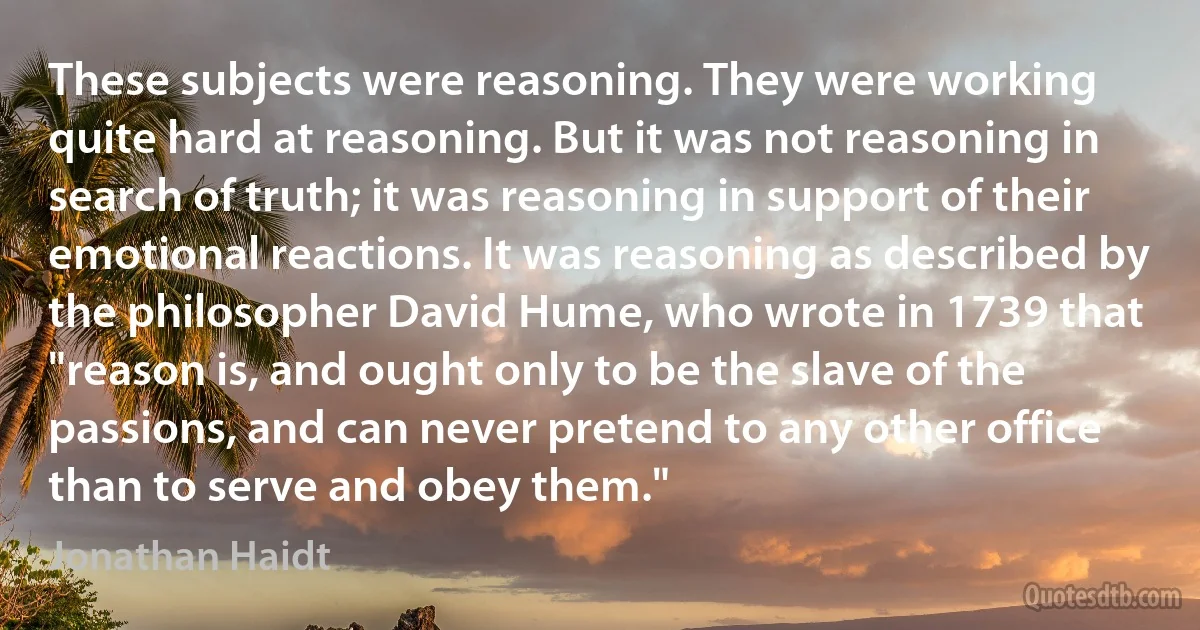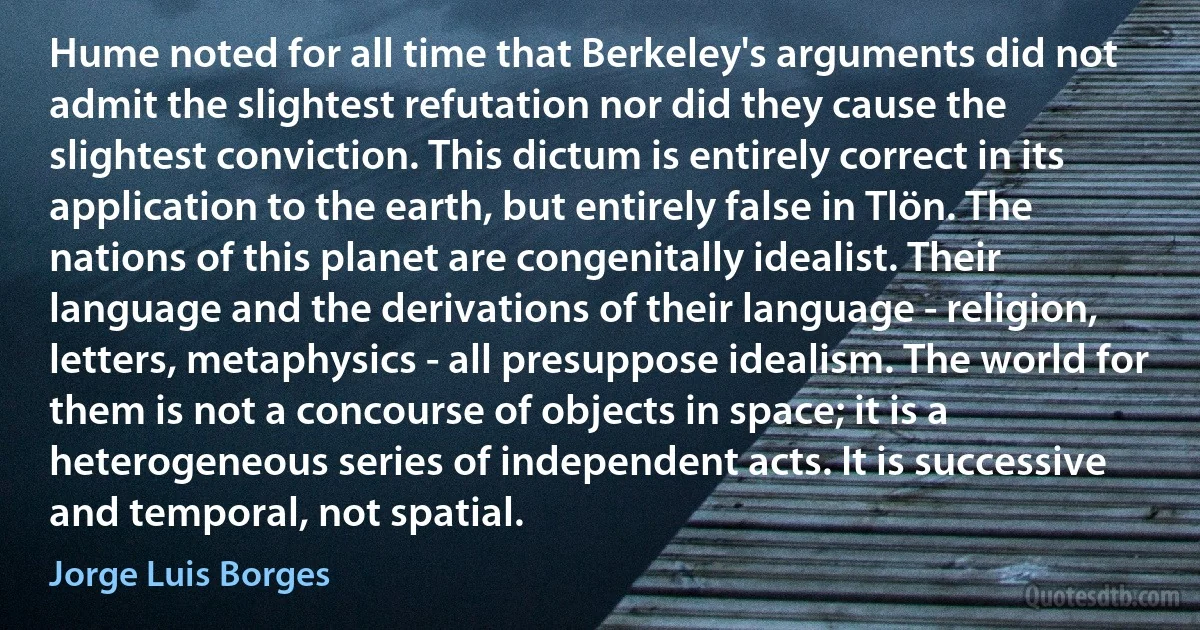Hume Quotes - page 2
One voice in the Great Conversation itself announces this modern point of view. In the closing paragraph of his An Enquiry Concerning Human Understanding, David Hume writes: "When we run over libraries, persuaded of these principles, what havoc must we make? If we take in our hand any volume ... let us ask, Does it contain any abstract reasoning concerning quantity or number? No. Does it contain any experimental reasoning concerning matter of fact and existence? No. Commit it then to flames: for it can contain nothing but sophistry and illusion." ... the positivists of our own day, would commit to burning or, what is the same, to dismissal from serious consideration ... Those books ... argue the case against the kind of positivism that asserts that everything except mathematics and experimental science is sophistry and illusion. ... The Great Conversation ... contains both sides of the issue.

Robert Maynard Hutchins
The great theme of his remarkable explorations in intellectual history is the danger of all constructivism, the belief that we can deliberately design social arrangements which will be better than those we unwittingly hit upon. Paradoxically, however, the drive of Hayek's own work is itself characteristically that of a rationalist construction. Admiring David Hume and detesting Auguste Comte, his genius was to marry the sceptical insights of the one to more than a touch of the compulsive rigour of the other.

Friedrich Hayek
Writing about the middle of the eighteenth century, David Hume proclaimed John Napier of Merchiston as 'the person to whom the title of a great man is more justly due than to any other whom his country ever produced.' This judgment of Hume is the more remarkable, seeing he was himself naturally disposed to exalt literature above science. ...when he awarded the first place among his countrymen to Napier... it was doubtless from an enlivened conviction that his work had been of greater service to humanity.

John Napier
What does Priestley mean, by an unbeliever, when he applies it to you? How much did he unbelieve himself? Gibbon had it right when he denominated his Creed, "scanty." We are to understand, no doubt, that believed the resurrection of Jesus, some of his miracles, his inspiration; but in what degree? He did not believe in the inspiration of the writings that contain his history. Yet he believed in the Apocalyptic beast, and he believed as much as he pleased in the writings of Daniel and John. This great and extraordinary man, whom I sincerely loved, esteemed, and respected, was really a phenomenon; a comet in the system, like Voltaire, Bolingbroke, and Hume. Had Bolingbroke or Voltaire taken him in hand, what would they have made of him and his Creed?

Joseph Priestley
Speaking of an institution such as marriage as natural is, of course, paying it a compliment, the compliment of saying that it meets a fairly central human need. The fact that it is found in some form in every human society is in a way enough to show. But it might be thought that marriage became thus widespread only because it was, like adequate sanitation, a means to an end. This is pretty certainly what Hume thought, as evidenced by his very confused contrast of natural with artificial virtues. He regarded human sagacity simply as the power to calculate consequences, and counted chastity and fidelity, with justice, as artificial virtues, devices designed merely to produce safety and promote utility. In a species as emotionally interdependent as man this view of marriage is nonsense. Pair-formation could never have entered anybody's head as a device deliberately designated to promote utility.

Mary Midgley
Joe Hume talked to me very earnestly about the necessity of an union of Liberals. He said much about Ballot and the Franchise. I told him that I could easily come to some compromise with him and his friends on these matters, but that there were other questions about which I feared that there was an irreconcileable difference, particularly the vital question of national defence. He seemed quite confounded, and had absolutely nothing to say. I am fully determined to make them eat their words on that point, or to have no political connection with them.

Thomas Babington Macaulay
Science had shifted, thanks to Bacon, into an emphasis on empirical observation. The problem is that, without a proper method, empirical observations can lead you astray. Hume came to... stress the need for some rigor in the gathering and interpretation of knowledge... epistemology... Hume is the first modern epistemologist... he was an obsessive skeptic and never believed... that a link between two items could be established as being causal.

Nassim Nicholas Taleb
Mr. Fraser Tytler, who promised me to look after it, is probably dissatisfied with the manner in which I have thought myself obliged to differ from his father; but which is no other, I believe, than he himself differed from Hume and Robertson. Magis amica Veritas was his motto, and is mine.

Joseph Ritson


